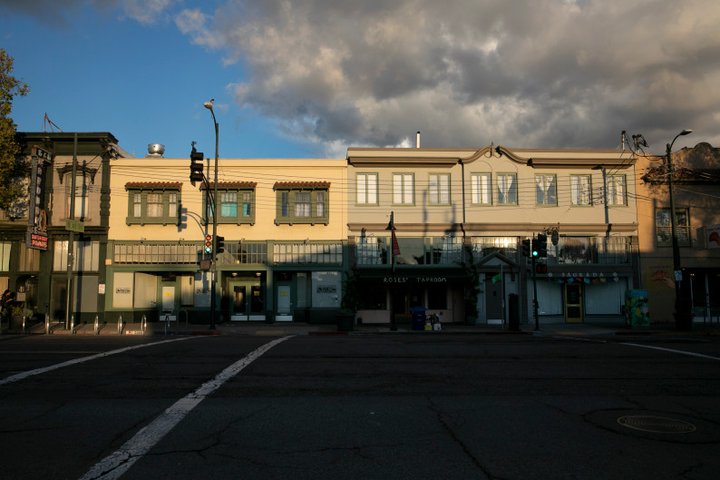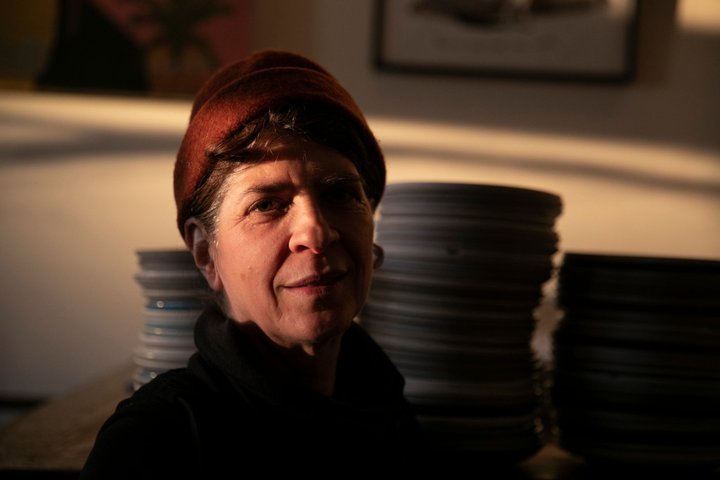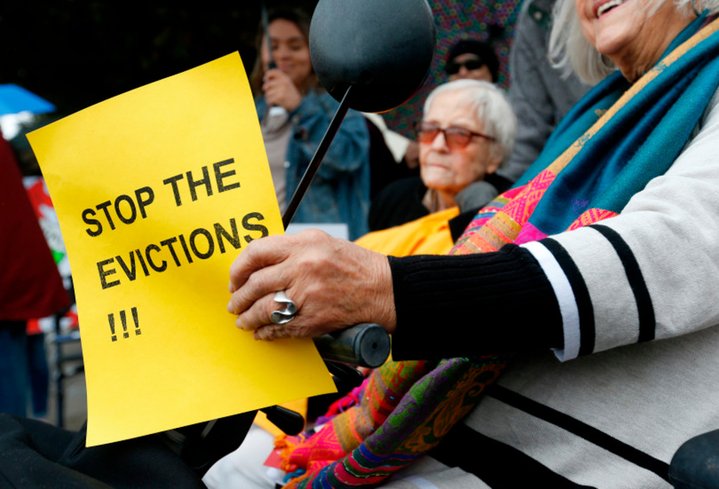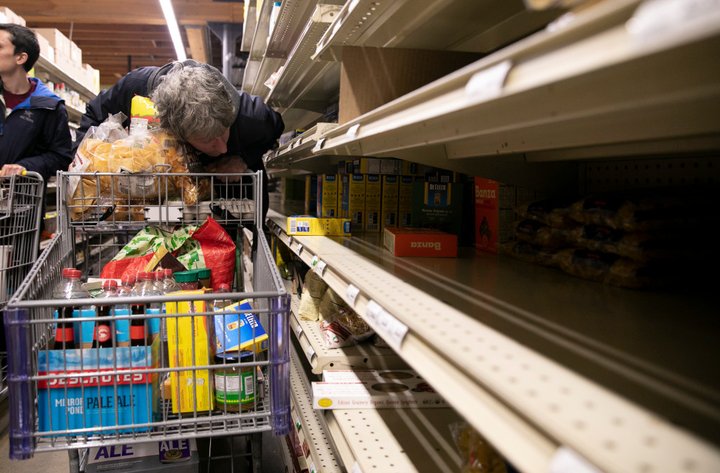
Shuttered businesses along Telegraph Avenue in Oakland on March 16, 2020. Bay Area counties enacted a shelter-in-place order until April 7 to curb the spread of the coronavirus. Other counties have passed similar orders. Photo by Anne Wernikoff for CalMatters
###
Donna Insalaco had to lay off 40 of the 45 employees at Pizzaiolo, her gourmet pizzeria in downtown Oakland, after sales fell through a “black hole.”
“A lot of tears,” Insalaco said, “All of us here live check-to-check.”
Responding to a statewide call for restaurants to close their doors to dine-in customers, Pizzaiolo is now only offering pick-up and delivery.
“We hope that we can limp by enough to stay open and call our staff back,” Insaleco said.
About 6.9 million Californians don’t have enough money to cover basic needs, according to the Public Policy Institute of California. Another 7.2 million are just above the poverty threshold for their county, one step away from calamity — a job loss, rent hike or surprise medical bill.
Now the coronavirus pandemic threatens to swell those ranks of poor Californians as restaurants, stores and other businesses shutter and workers stay home.
“Whole sectors will have to turn off. And that means that millions of people’s livelihoods will turn off,” said Jesse Rothstein, a professor of public policy at UC Berkeley. “Very few Americans have cushions to be able to live for months without pay, and low-wage workers, even less so.”

Pizzaiolo part owner Donna Insalaco hopes that the business will be able to survive the shelter-in-place order. “We had to lay off everybody that is not a salaried employee,” she said. “We were all crying today.” Photo by Anne Wernikoff for CalMatters
In response, local, state and federal lawmakers are proposing — and, in some cases, enacting — new ideas to soften the economic blow for low-income people, including sending cash to people and halting all evictions and foreclosures.
Jessica Bartholow, a policy advocate at the Western Center on Law and Poverty, said shutting down schools and businesses has “really hard consequences that we’re now struggling to address” but if it stems the spread of the virus “the overall outcome for families will be better.”
The economy already has entered a recession expected to continue through September, according to a UCLA Anderson report released Monday.
Who’s most at risk of losing work as the pandemic progresses?
“Low-wage workers broadly. People who are hourly, not salaried. People who work for small businesses, people who don’t have paid sick leave. People who depend on cash coming in the door of their businesses in order to cover their paychecks,” Rothstein said.
About a quarter of California employees do some work from home, according to Census data. But workers in retail, service, manufacturing, agriculture and transportation simply can’t take their work home with them.
About 18% of American adults and 25% of those making less than $50,000 a year, reported last week that they had lost jobs or hours, according to a survey by NPR, PBS NewsHour and Marist of 835 working adults.
Keeping more people from falling into financial catastrophe is all the more important during a pandemic because poverty conditions can compromise people’s health and compel them to work when it’s safer for them to stay home, causing viruses to spread faster.
“California’s one of the best places to weather these storms,” Bartholow said. “I think the question about whether each decision made will increase inequality will be considered.”
Here’s a breakdown of the state and federal proposals under consideration:
Immediate cash and tax relief
The White House announced plans to send cash payments directly to Americans to replace lost wages over the next two weeks, as part of a $1 trillion stimulus proposal. The plan includes $500 billion for two waves of direct payments to taxpayers on April 6 and May 16 that would vary by household income and size. Another $300 billion would help small businesses meet payroll, the New York Times reported. Politico reported that the checks could amount to $1,000 each.
“We want to make sure Americans get money in their pockets quickly,” Treasury Secretary Steven Mnuchin said on Tuesday.
Senate Democrats are pushing their own proposal: immediate $2,000 payments to all adults and children in the US below a certain income threshold. If enacted, people would get a second check for $1,500 in July and a third for $1,000 in October if the public health emergency continues.
U.S. senators are reportedly working on a stimulus package aimed at providing relief for small and large businesses. The U.S. Small Business Administration is offering low-interest federal disaster loans to California small businesses that suffer as a result of coronavirus.
Additionally, the Internal Revenue Service has delayed the deadline for taxpayers and businesses to pay their taxes to July 15.
Bans on evictions, foreclosures and utility shut-offs
President Donald Trump announced Wednesday that the Department of Housing and Urban Development would suspend evictions and foreclosures until the end of April. Details were unavailable, but it is likely that order applies only to federally funded housing.
From Sacramento to Los Angeles, large cities across the state enacted their own local moratoria on evictions related to coronavirus.
On Monday, Newsom issued an executive order that waives a section of the state civil code, clearing the way for more localities to ban residential and commercial evictions related to coronavirus through May 31. The order also asks banks and other financial institutions to halt foreclosures.
Newsom also instructed the California Public Utility Commission to monitor how utilities are protecting customers from power, water, cell phone and internet shutoffs. Already the state’s largest power utilities, serving more than 21 million Californians, have voluntarily done so. Comcast is providing 60 days of free basic internet service to new customers.

Martha Kapla, right, holds a sign during a rally in front of an assisted-living home in San Pablo, California, in December. Nearly 80 elderly and disabled residents were told to be out of the building by the end of January. Photo by Jane Tyska, Bay Area News Group.
However, Newsom’s action falls short of a statewide halt on evictions, foreclosures and power shutoffs, provoking swift criticism from tenants rights groups and anti-poverty advocates who said that without it, many people would be evicted into homelessness at a time when having a home is of the utmost importance.
Both landlord groups and tenant-rights activists have asked the administration for emergency assistance for struggling renters, which Newsom could fund with the $1.1 billion that the Legislature passed for the state’s COVID-19 response.
Another novel idea: Los Angeles has temporarily stopped ticketing cars left in residential areas during street sweeping, and will stop ticketing and towing abandoned vehicles.
Boosting paid leave, unemployment benefits
The U.S. House of Representatives passed a coronavirus relief bill that would provide federally-funded emergency leave, including two weeks of paid sick leave and up to three months of paid family and medical leave. Excluded, however, are millions of Americans who work for companies with more than 500 employees. The Senate is expected to vote on the plan this week.
Unlike many states, California law entitles most workers to at least three days of paid sick leave, and several California cities require more than that.

Kazem ZiaEbrahimi, a bartender at Beeryland in Oakland, was at the bar on the last night it will be open for at least three weeks. ZiaEbrahimi plans to apply for unemployment and stressed they will “be okay” through April 7. Photo by Anne Wernikoff for CalMatters.
California workers who have lost hours or jobs because of the virus can file for unemployment benefits, while those unable to work because they have contracted the virus or been quarantined can apply for disability benefits. Last week Newsom signed an executive order waiving the one-week unpaid waiting period for both benefits due to COVID-19.
A California work sharing program allows businesses facing financial hardship to avoid laying off employees.
More help buying groceries
The House’s package would also put $500 million towards grocery money assistance for pregnant women and mothers with young children who lose work and $250 million to provide home-delivered and pre-packaged meals to low-income seniors.
A federal judge on Friday temporarily blocked the Trump administration’s food stamp cuts, which starting April 1 would have kicked able-bodied adults without dependents who work or train for fewer than 20 hours per week off of the Supplemental Nutrition Assistance Program.
“As a global pandemic poses widespread health risks, guaranteeing that government officials at both the federal and state levels have flexibility to address the nutritional needs of residents and ensure their well-being through programs like SNAP is essential,” wrote Chief U.S. District Judge Beryl Howell in her opinion.
Also, with more than 97% of California’s public school students affected by coronavirus closures, many families will still be able to receive free and reduced-cost meals. The U.S. Department of Agriculture approved a waiver that allows closed California schools to continue to serve the federally-funded meals.
As of Tuesday night, the state had not released a plan for making sure that all residents had access to food, particularly the elderly and ill who have been told not to leave their homes.

Andy Jordan peers into an empty shelf in the pasta aisle at Berkeley Bowl on March 13, 2020. Shelves of basic items like pasta, toilet paper and flour emptied across the store as shoppers prepared to stay home for the next two weeks. Photo by Anne Wernikoff for CalMatters
One answer could be food banks. The House’s coronavirus package includes $400 million for food banks to purchase and distribute foods. The California Association of Food Banks has also requested state funding to purchase food and staff food banks, which are currently facing precipitous drops in volunteers and cancellations of their distribution sites.
Coronavirus treatment for all?
In the crowdless Democratic primary debate between Bernie Sanders and Joe Biden, Sanders zeroed in on the coronavirus crisis as further proof of the need for universal and free health care.
In fact, the idea of universal coverage at least for coronavirus treatment is gaining mainstream steam. The House coronavirus bill would guarantee free testing for all Americans.
State Sen. Maria Elena Durazo, a Los Angeles Democrat, urged Newsom to go even further, extending Medi-Cal coverage for coronavirus-related testing and treatment to all Californians, regardless of immigration or insurance status.
Currently, some health clinics lare waiving test fees for the uninsured. The California Department of Public Health has said that people who are uninsured and have symptoms should contact their local health department to find out where free tests might be available.
###
CALmatters.org is a nonprofit, nonpartisan media venture explaining California policies and politics.
CLICK TO MANAGE